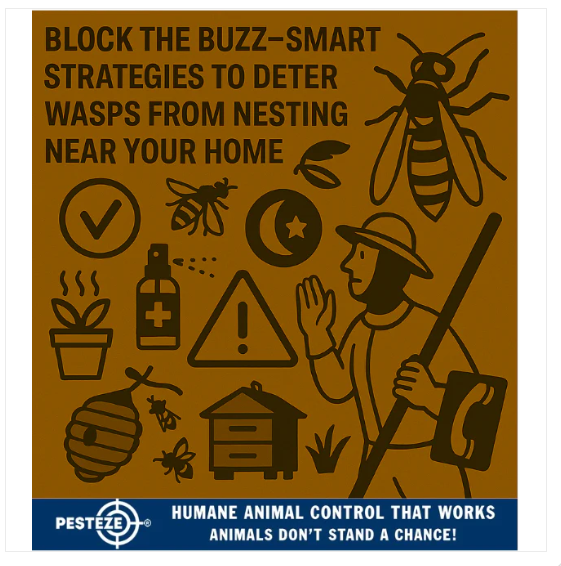EFFECTIVE WAYS TO DETER WASPS FROM NESTING

EFFECTIVE WAYS TO DETER WASPS FROM NESTING
SUMMARY
Wasps can be beneficial pollinators, but when they nest too close to your home, they become a safety hazard. Preventing nests before they form is far easier than removing them later. This guide outlines natural repellents, structural fixes, and smart landscaping tips to keep wasps from settling in.
FEATURES
-
Remove Food Sources: Clean up sugary spills, cover trash bins, and relocate hummingbird feeders.
-
Seal Cracks and Holes: Patch gaps in siding, eaves, and vents to eliminate nesting spots.
-
Use Essential Oils: Spray peppermint, lemongrass, or rosemary oil around entry points and outdoor areas.
-
Hang Decoy Nests: Wasps are territorial—fake nests can discourage new colonies from forming nearby.
-
Plant Wasp-Repelling Herbs: Grow mint, basil, and citronella to naturally deter wasps from your garden.
-
Maintain Outdoor Spaces: Rake fallen fruit, trim overgrown shrubs, and keep compost piles covered.
GUIDE DESCRIPTION
Wasps are drawn to areas with easy access to food, shelter, and water. While they play a role in pest control and pollination, their nests near homes, patios, or barns can lead to painful stings and aggressive behavior—especially from species like yellowjackets.
The first step in prevention is removing attractants. Wasps love sugary substances, so clean up soda spills, fruit juice, and marinades after outdoor meals. Keep garbage bins sealed tightly and compost piles covered. Relocate hummingbird feeders away from high-traffic areas.
Structural maintenance is key. Wasps often nest in cracks, holes, and gaps in siding, soffits, and vents. Use caulk, expandable foam, or fine mesh to seal these entry points. Regular inspections in spring and summer can catch potential nesting spots early.
Natural repellents work well. Essential oils like peppermint, lemongrass, rosemary, and clove are unpleasant to wasps. Mix a few drops with water in a spray bottle and apply to door frames, windowsills, and outdoor furniture. Reapply weekly or after rain.
Decoy nests are a clever deterrent. Wasps are territorial and avoid nesting near other colonies. Hanging a fake nest in areas where you’ve previously had activity can discourage new arrivals.
Landscaping also plays a role. Plant herbs like mint, basil, and citronella around patios and garden beds. These plants emit scents that repel wasps while adding beauty and utility to your space.
Finally, keep outdoor areas tidy. Rake up fallen fruit, trim back dense shrubs, and avoid leaving pet food outside. These steps reduce the appeal of your property and make it harder for wasps to settle in.
With consistent effort and natural solutions, you can enjoy your outdoor space without the buzz and sting of unwanted guests.
- Amy Chang


Comments 0